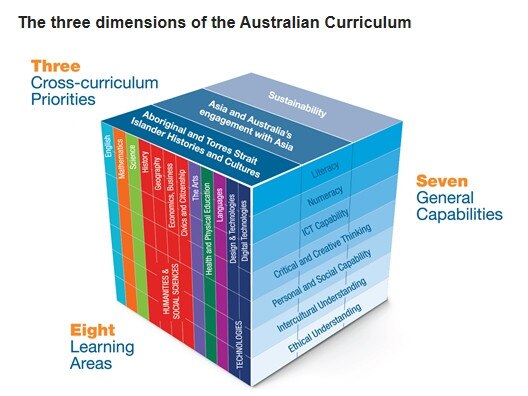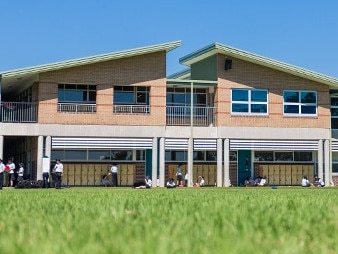School curriculum in Australia is overcrowded with new tasks for teachers once handled by parents
Teachers are fuming and experts are furious after fringe groups have hijacked our national curriculum with ‘box-ticking’ subjects that take away time from learning numeracy and literacy.

VIC News
Don't miss out on the headlines from VIC News. Followed categories will be added to My News.
The Australian curriculum is overcrowded, complex and riddled with too many ‘box-ticking’ subjects that have been hijacked by fringe groups, academic experts say.
Schools are taking on extra responsibilities traditionally handled by parents or other institutions in trying to teach subjects like dance, road safety, health, gender based violence and cyber safety, which is crowding out key subjects like numeracy and literacy.
It comes as one school has removed language classes in Mandarin, Spanish, French, Japanese, German and Italian from its curriculum and replaced them with indigenous language classes.
Federal Education Minister Dan Tehan this week labelled the overcrowded curriculum as one of the key concerns in the fall out of the 2018 Programme for International Student Assessment (PISA) report, which showed Australian students are years behind in core subjects of reading, maths, and science.
Mr Tehan told News Corp yesterday the curriculum had to be streamlined to again focus on literacy and numeracy.

“Teachers want to be able to teach – they are sick of having to go though tick-a-box exercise trying to fulfil all the needs of the curriculum,” he said.
“Our plan is very much focused around literacy and numeracy as the foundation of learning and embedding literacy and the heart of primary and secondary schools and have everything spring from that.”
He said the PISA results will be top of the agenda at the upcoming Education Council meeting of Education Ministers next week, which follows the 2014 review of the overcrowded curriculum, which made 30 key recommendations, of which only half were accepted.
He said he hoped PISA was the lightening rod that would galvanise the states and territories into action.
“My hope is that these PISA results should be the alarm bell that drives action in the classroom.”
The complicated national curriculum model has eight learning areas, seven general capabilities and three “cross-curriculum priorities” of Indigenous study, Engagement with Asia and Sustainability that is weighing teachers down and causing them to rush through subjects.

For example 95 new Science ‘elaborations’ addressing Aboriginal and Torres Strait Islander Histories and Cultures have been added to help close the gap in knowledge around indigenous culture – but experts say it is just another element putting pressure on teachers who feel they need to plough through each one.
The elaborations are designed to be embedded in the curriculum but instead are often treated like a checklist that must be ticked off, particularly by more inexperienced teachers.
They are described as “bonkers” by one principal who said the long list of elaborations were compounded by the additional subjects added by niche groups.
“Education is a great place for a fad, it has been hijacked by interest groups,” he said.
Professor Geoff Masters, CEO of the Australian Council for Educational Research (ACER) lead the recent review into the NSW Curriculum and said the impact of curriculum overcrowding can be seen across the country.
“We have seen things that have been added to the curriculum through government decisions to include particular health or social issues – things that might have in the past been dealt with by families or other institutions.
MORE NEWS
WHY OUR SCHOOLS ARE FALLING BEHIND
HUGE PROBLEM WITH YEAR 6 CLASSES
WHO IS TO BLAME FOR AUSTRALIA’S TERRIBLE PISA RESULTS?
“What we know from PISA is that our 15 year old students are performing less well on tasks that require them to apply their understanding to new kinds of problems and to do that they need to have deep understanding of concepts and principles.”
“Our curriculum needs to make sure that students have the opportunity to develop deep understanding so that they can apply it to new problems they haven’t seen before.
“Teachers often are under pressure to cover a lot of material in the curriculum. This can limit their ability to teach in depth. We need to create more time by trying to cover less so students can develop a deeper understanding of important ideas,” he said.
In terms of the cross-curriculum priorities he said: “what is it that every Australian should know about Aboriginal people culture and history and let’s be clear on the subjects in the curriculum, in which we can develop those understandings.”
Fiona Mueller, Director of Education at the Centre for Independent Studies said the packed national curriculum is aggravated when states and territories then add on.
“The curriculum has become a bit of a checklist; ‘I better make sure I tick off every single one,’” she said.
“The size of our curriculum volume is also so much greater than that of our counterparts. It is a monster. We need a really succinct, tight document that teachers can work with that guides them clearly but they can use in their different settings.”
Education leaders said any curriculum review must be treated carefully by experts who shouldn’t simply chop out subjects but rather prioritise what is really central to core knowledge.

READ MORE:
FIVE-YEAR NAPLAN TRENDS: HOW EVERY SCHOOL PERFORMED
ANALYSIS: WHICH SCHOOLS HAVE IMPROVED THE MOST?
VICTORIA’S MOST CONSISTENT NAPLAN SCHOOLS REVEALED
In Kellyville in Sydney’s north west the William Clarke College has recently streamlined its curriculum and will remove all languages except for teaching Indigenous, will reduce homework and will “reclaim the purposes of schooling” with a slower pace for students and more preparation time for teachers.
One parent, who asked to remain anonymous said the school did not consult parents when introducing the streamlined curriculum, that it had not been properly thought through and was robbing students of key learning areas.
MORE COVERAGE: YOUR COMPLETE GUIDE TO EDUCATION NEWS
The school recently posted on its website that it will remove language classes in Mandarin, Spanish, French, Japanese, German and Italian and instead introduce Coding and Robotics (in Science and Technology) and languages, other than Indigenous, will be offered as additional paid courses.
The school told parents that the “reimagined curriculum” will better prepare students for a life after school and said they have removed languages due to lack of interest but in order to fulfil curriculum requirements of 100 hours of language learning “we will be offering an indigenous language.”
A presentation by the principal says that leading universities predict the ATAR will be extinct within the next 5-7 years and that students need to learn new skills.


